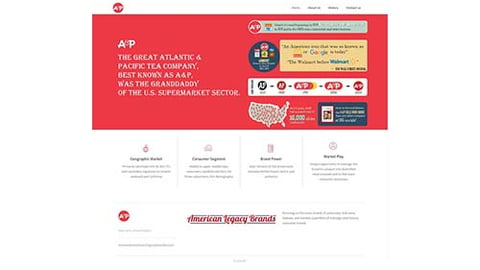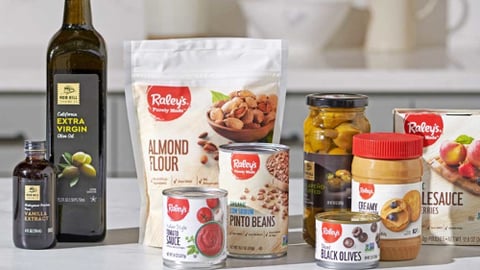Private Label’s Ecommerce Opportunity
Online retailing is poised to transform the grocery industry as a whole, so it stands to reason that it has the potential to play a significant role in how private label is marketed to consumers.
“Projections suggest that the ecommerce private label market will quadruple in the next five years as a result of the widespread use of smartphones, improved online interfaces and mobile apps, as well as an expansion of crowd-sourced business models to meet growing shopping and delivery demand,” noted Steven Howell, solutions sales consultant at Nottingham, England-based Solutions for Retail Brands Inc. (S4RB).
According to Howell: “Ecommerce has the potential to be a great tool to expand exclusive product offerings and create more brands to be sold exclusively online. With current technology, it should be easy for innovative manufacturers to apply to become suppliers and then receive support to continue their development.”
He further believes that “[b]y working closely with suppliers, retailers can offer access to onboarding, additional knowledge and shared results. This means ecommerce can become the go-to method to test new innovative products and achieve customer feedback quickly on product quality and consumer tastes.”
This online opportunity is particularly ripe for companies like ecommerce membership-based retailer Thrive Market.
“Private brands continue to be a massive opportunity in the ecommerce space,” affirms Jeremiah McElwee, SVP merchandising and product development at Los Angeles-based Thrive. “The primary reason is that you can communicate directly with your customer to tell the story behind your brand and specific product offerings more effectively than brick and mortar. As someone who spent 20-plus years in physical retailing, I am delighted every day working in the ecommerce space by the direct line of communication, coupled with how quickly we can understand our customers’ needs and get their feedback. From product reviews to social media to our amazing member services team, we get instant input from our customers every day, and it shapes every decision we make going forward as we develop and launch products.”
Even for more traditional food retailers, however, the potential is great, with their brick-and-mortar and online operations able to work in tandem.
“Through ecommerce, there are unique opportunities that can add to in-store private label initiatives,” notes Matt Van Gilder, manager, ecommerce operations at Grand Rapids, Mich.-based distributor and grocer SpartanNash. “From a visibility standpoint, we can highlight new items through promoted placements or display seasonally relevant product collections on the Fast Lane homepage."
Fast Lane, the grocer’s online grocery shopping platform, is currently available at more than 60 SpartanNash stores, including Family Fare Supermarkets, D&W Fresh Market, VG’s Grocery, and Dan’s Supermarkets in six states. The company additionally provides click-and-collect online solutions for its independent retail customers, who can likewise boost their private label sales via ecommerce.
“We can also personalize the experience in real time by presenting private label recommendations based on what the customer is viewing, items in their cart, or a combination of both their in-store and online shopping history,” says Van Gilder. “Looking forward, as we continue to expand our integrated Fast Lane recipe feature, we will have the capability to prioritize our private label products as shoppable featured items in the recipe ingredients.”
Millennials and Conscious Consumers
Unsurprisingly, private label-loving Millennials are in the vanguard of those shoppers interested in purchasing such items online.
“Millennials are … the generation driving the growth we have seen in ecommerce,” observes Alex Smith, business analyst at Wilton, Conn.-based Cadent Consulting Group. “Thus, there is great opportunity for private label online with this growth-driving generation.”
Abby Ayers, senior business development manager of retail at Oakland, Calif.-based Fair Trade USA, which collaborates with retailers on private label Fair Trade Certified products, agrees, noting that “ecommerce is really turning to unique and well-defined private brands to build loyalty and engage with the Millennial and Gen Z consumer.”
Somewhat echoing McElwee’s comments, but with a particular application to organizations such as her own, Ayers continues: “The growth of ecommerce platforms allows consumers to get even more information on products that traditionally wouldn’t fit on packaging, such as who made the products, where they came from, what their values are. Retailers can take advantage of the conscious-consumer trend by leveraging the demand and awareness of certification as a means to build trial, gain new consumers and build loyalty. By working with sustainability certifications like Fair Trade USA, these ecommerce channels are building brand guard rails and product assortments that defend their triple bottom lines: protecting people and planet, and making a profit. In doing so, they are connecting with the conscious consumer and building a consumer base that trusts and believes in their private brand.”
Beyond the ability “to demonstrate transparency and the product’s path from production to cart,” she points out the design and content possibilities: “There is so much opportunity online to provide amazing visuals and clarity around all of these topics.”
Smith in particular thinks that private label’s online ubiquity is just a matter of time, observing that “the ecommerce titan, Amazon, owns an impressive 100-plus private brands across multiple categories, and as we have seen, where Amazon goes, brick and mortar will likely follow.”
Mastering the Fundamentals
For some, however, the ecommerce opportunity isn’t all that different from the in-store opportunity.
Noting the importance of stressing quality over low price and the development of innovative, creative products, Brian Sharoff, president of the New York-based Private Label Manufacturers Association, asserts, “The purchasing process may change and delivery options may change, but the rules of store-brand success are fundamental.”
Meanwhile, Retail Business Services, a company of Carlisle, Pa.-based Ahold Delhaize USA, has implemented a set of best practices encompassing the entire private-brand process that guides its approach to everything, including the digital world. “In terms of ecommerce, the consideration set doesn’t change, it just becomes a matter of how to translate these best practices for online,” explains Juan De Paoli, Retail Business Services’ SVP, private brands.
As it does that, however, Retail Business Services will seek the assistance of Ahold Delhaize USA’s Peapod Digital Labs, the ecommerce engine for the grocer’s U.S. portfolio. “In the private-brand organization, we’ll be working closely with the Peapod Digital Labs’ omnichannel initiatives to support the private-brand experience and journey,” says De Paoli.
What it’s all about, of course, is making sure that consumers get the items they want as quickly and painlessly as possible, while retailers rack up return website visits and higher sales.
“Private brands in ecommerce are ways to both differentiate and drive loyalty,” observes Doug Baker, VP, private brands and technology at Arlington, Va.-based Food Marketing Institute. “As consumers are looking for more convenient ways to shop, they still want to get the brands they trust.”






